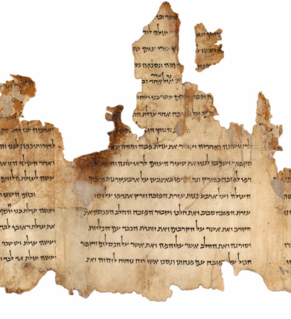Talik is a layer of year-round unfrozen ground that lies in permafrost areas.
Talik may also refer to:
- A nickname of Israel Tal, Israeli general
- Tâlik, Turkish simplification of the Nastaʿlīq script
- Taʿlīq script
Talik is a layer of year-round unfrozen ground that lies in permafrost areas.
Talik may also refer to:
The Hebrew alphabet, known variously by scholars as the Ktav Ashuri, Jewish script, square script and block script, is an abjad script used in the writing of the Hebrew language and other Jewish languages, most notably Yiddish, Ladino, Judeo-Arabic, and Judeo-Persian. It is also used informally in Israel to write Levantine Arabic, especially among Druze. It is an offshoot of the Imperial Aramaic alphabet, which flourished during the Achaemenid Empire and which itself derives from the Phoenician alphabet.

Hebrew is a Northwest Semitic language of the Afroasiatic language family. Historically, it is one of the spoken languages of the Israelites and their longest-surviving descendants, the Jews and Samaritans. It was largely preserved throughout history as the main liturgical language of Judaism and Samaritanism. Hebrew is the only Canaanite language still spoken today, and serves as the only truly successful example of a dead language that has been revived. It is also one of only two Northwest Semitic languages still in use, with the other being Aramaic.
East Sea or Eastern Sea may refer to:
Cham or CHAM may refer to:
OL may refer to:

Lior Narkis is an Israeli singer.
TA or ta may refer to:

Israel Tal, also known as Talik, was an Israel Defense Forces (IDF) general known for his knowledge of tank warfare and for leading the development of Israel's Merkava tank.
An acre is a unit of measurement used for areas of land.

.il is the Internet country code top-level domain (ccTLD) of Israel, administered by the Israel Internet Association and managed by NIC - ISRAEL, which hosts the DNS root server and manages the Israeli Internet Exchange, that supports IPv4 and IPv6.

A talik is a layer of year-round unfrozen ground that lies in permafrost areas. In regions of continuous permafrost, taliks often occur underneath shallow thermokarst lakes and rivers, where the deep water does not freeze in winter and thus the soil underneath does not freeze either. Sometimes closed, open, and through taliks are distinguished. These terms refer to whether the talik is surrounded by permafrost, open at the top, or open both at the top and above an unfrozen layer beneath the permafrost.

JSON is an open standard file format and data interchange format that uses human-readable text to store and transmit data objects consisting of attribute–value pairs and arrays. It is a common data format with diverse uses in electronic data interchange, including that of web applications with servers.

The Paleo-Hebrew script, also Palaeo-Hebrew, Proto-Hebrew or Old Hebrew, is the writing system found in Canaanite inscriptions from the region of biblical Israel and Judah. It is considered to be the script used to record the original texts of the Hebrew Bible due to its similarity to the Samaritan script, as the Talmud stated that the Hebrew ancient script was still used by the Samaritans. The Talmud described it as the "Libona'a script", translated by some as "Lebanon script". Use of the term "Paleo-Hebrew alphabet" is due to a 1954 suggestion by Solomon Birnbaum, who argued that "[t]o apply the term Phoenician to the script of the Hebrews is hardly suitable".
Judeo-Moroccan Arabic is the variety or the varieties of the Moroccan vernacular Arabic spoken by Jews living or formerly living in Morocco. Historically, the majority of Moroccan Jews spoke Moroccan vernacular Arabic, or Darija, as their first language, even in Amazigh areas, which was facilitated by their literacy in Hebrew script. The Darija spoken by Moroccan Jews, which they referred to as al-‘arabiya diyalna as opposed to ‘arabiya diyal l-məslimīn, typically had distinct features, such as š>s and ž>z "lisping," some lexical borrowings from Hebrew, and in some regions Hispanic features from the migration of Sephardi Jews following the Alhambra Decree. The Jewish dialects of Darija spoken in different parts of Morocco had more in common with the local Moroccan Arabic dialects than they did with each other.
Etan Cohen is an Israeli-American screenwriter and film director who has written scripts for Hollywood movies, including Tropic Thunder, Madagascar: Escape 2 Africa, Men in Black 3, and The Bad Guys.

"The Man Who Can't Be Moved" is the second single from Irish band the Script from their debut album The Script. The song was released on 25 July 2008. The song was used heavily in the CBS show Ghost Whisperer during its fourth season. This song served as their radio promotional single in the United States, gaining airplay on multiple radio stations. On 8 June 2009, the song was released as the second official single in the United States. The song was chosen as one of the soundtracks for the 2009 Victoria's Secret Fashion Show. This song has been covered by the American a cappella group Straight No Chaser.

Wix.com Ltd. is an Israeli software company, publicly listed in the US, that provides cloud-based web development services. It allows users to create HTML5 websites and mobile sites through the use of online drag and drop tools. Along with its headquarters and other offices in Israel, Wix also has offices in Brazil, Canada, Germany, India, Ireland, Japan, Lithuania, Poland, the Netherlands, the United States, Ukraine, and Singapore.
Ayangudi may refer to:
Chait, also transliterated as Khait, is a Jewish family name, from Hebrew חייט, “tailor”. Notable people with the surname include:
Reyhan is a given name. It may refer to: